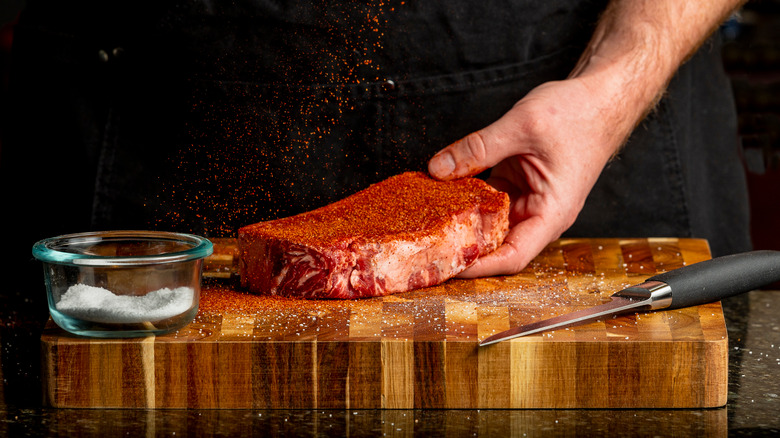Why You Should Salt Your Meat Before Adding Dry Rub
A lot of us grew up with the idea that if you wanted more flavorful meat you needed to marinade it or give it a dry rub and let it sit. The idea seems intuitive enough, covering a steak with herbs and spices gives the meat time to absorb all those tastes. And of course, you want there to be salt in your dry rub because salt is essential to seasoning everything. However, like a lot of kitchen tricks you may have learned years ago, there isn't actually anything backing up these assumptions. The reality is that no matter how long they sit, the spices in dry rubs will never penetrate beyond the edge of your meat. Salt is different though. Salt's special chemistry means you should add it early and let it sit.
The reason you should salt well before dry rubbing has to do with molecular reactions too small to see. Flavor molecules from rubs are too big to penetrate the wall of meat cells, meaning they never really get absorbed. But salt can dissolve and be taken in by cells. Not just that, but cells will naturally attempt to balance out their salt levels by transferring it from areas of high concentration to low-concentration areas through a process called diffusion. So the highly concentrated salt on the exterior of your meat will gradually move to the interior, fully and evenly seasoning it all the way through to the center.
Salt needs time to fully season the whole cut of meat
Salt can gradually make its way into your chicken or pork, but this takes time. You should salt the exterior of your meat, in a process called dry brining, at least a few hours before cooking, and ideally 24 hours ahead of time to let it fully season. Some larger roasts may take two or three days. Letting a dry rub sit on the outside of your meat during this time won't help it at all, and may even hurt a little. Spices and herbs lose flavor when they come in contact with air through the process of oxidation, which is why they need to be tightly sealed in containers to stay fresh. Letting them sit exposed to the air of the fridge for a full day or more is only going to mean they lose some potency.
There are also a few smaller reasons you should apply salt before a dry rub. The amount of salt you need is more closely tied to the full weight of your meat, and for larger cuts, you may need more salt than would normally be in a balanced dry rub, so it helps to measure and apply them separately anyway. Finally, salting ahead of time and letting the meat sit exposed to the air of a fridge will desiccate the outside, which helps it brown better. So start with the magic of salt, and save the rub for right before you cook.

